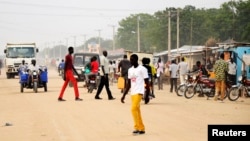Refugee Michael Deng Gaduel is one of about 50,000 who have sought safe haven from the fighting at a United Nations site near Bentiu - a strategic town near some of South Sudan’s most important oil fields. It has changed hands many times during the year-old conflict. On a recent morning, the 26-year-old primary school teacher recounted his difficult experience.
“Even me I come here through difficulties. I spent about five days in the bush without drinking any water. I taste also even then the urine, I drank the urine,” he confessed.
Deng has a lot to be angry about. He came here almost exactly one year ago, just about when war broke out. Since then he said he has led a life that seemed no better than that of an animal. Flies swarmed around his head while he talks sitting in a heated mud hut covered with plastic sheets.
According to analysts, the tens of thousands of refugees and jobless have no time for taking to the streets. Their main concern is to make ends meet. There is possibly another explanation: South Sudan is a militarized state that suppresses opposition.
The U.N. camp where Deng lives stands on a barren field with no escape from the South Sudanese sun. Food, water and electricity are scarce. But the worst part, people say, is having nothing to do and feeling imprisoned because outside the camp it is too dangerous.
“The problem is that African, I can say, Africa in general is different from Europe, is different from USA, is different from other continent," Deng said, when asked why no one protests against their elected leaders who are responsible for this situation.
"In South Sudan here, we say that South Sudan we use democratic system. And that one, it remains in the books. Even if you make a protest now, you can be killed,” he added.
Military state
South Sudan is a militarized state. Soldiers and guns are omnipresent. The government is mostly made up of former guerillas with no room for outsiders who did not physically fight for independence that became reality three years ago. The Sudan People’s Liberation Movement party rules the country with an iron fist.
In the history of many countries, it was often a student movement that began a struggle for change. But following ethnic clashes between students at Juba University two years ago, the school administration banned student associations. Outside the university, medical student David Thut Ali said they feared to openly speak their minds.
“And it is very difficult to express our feelings. They just talk of freedom, freedom. Of which freedom? It is not in place; it is not in action,” he said.
Many students shared his opinion, but feared sharing their names because of South Sudan’s security service.
After three more student interviews, a man in plain clothes approached, insisted in Arabic to follow him to a police station and took my journalistic accreditation.
I asked a nearby soldier to be my translator and follow me as a backup. After a five-minute walk, the plainclothes officer relented and then told me to report to him the next day.
Deng Athuai Mawiir - one of South Sudan’s most outspoken government critics - knows all too well the risks for activists. As the head of the South Sudan Civil Society Alliance he has challenged the government of President Salva Kiir and his former deputy-turned rebel Riek Machar many times. Two years ago, he was kidnapped. And just a few weeks ago, he said, an unknown gunman almost killed him on the street.
“I start the car. Somebody came out on other side and he shot. I heard the bullet. It broke both windows and he missed here. And then from there I just came out. The second shooting shot me from here,” he said.
Today, Deng Athuai Mawiir lives in a secured hotel of a friend that he seldom leaves. But he doesn’t want to go in exile. He said South Sudan was his country and he wanted to correct the difficult situation that his people were in.






